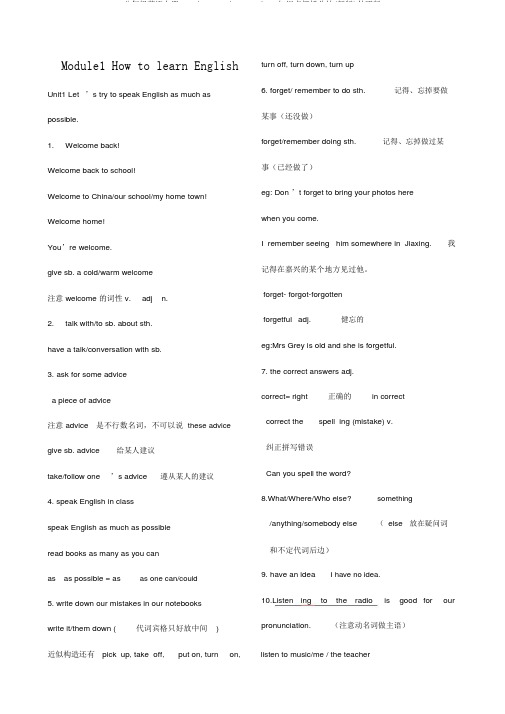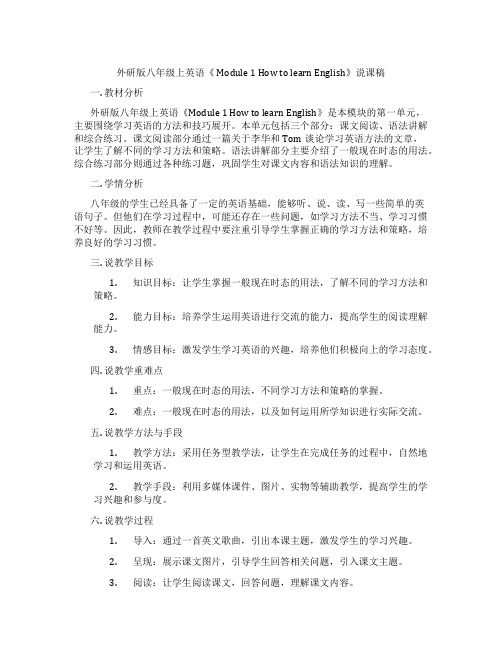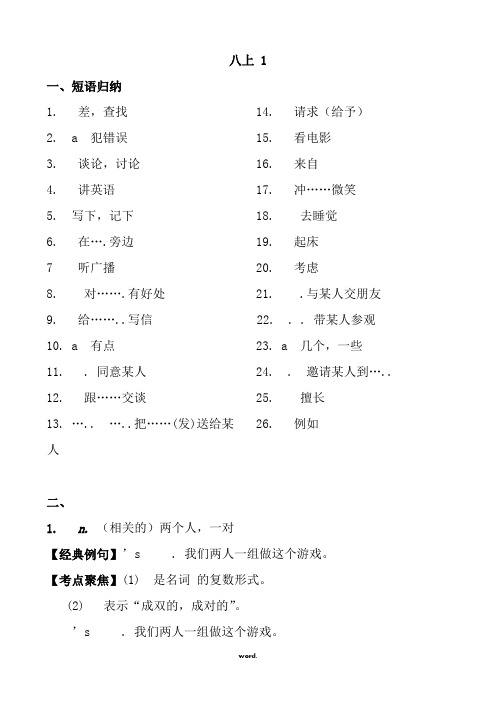外研版初中英语初二上册Module 1 How to learn English 综合能力演练
- 格式:doc
- 大小:60.50 KB
- 文档页数:7


Module1 How to learn English Unit1 Let’s try to speak English as much as possible.1.Welcome back!Welcome back to school!Welcome to China/our school/my home town! Welcome home!You’re welcome.give sb. a cold/warm welcome注意 welcome 的词性 v. adj n.2.talk with/to sb. about sth.have a talk/conversation with sb.3.ask for some advicea piece of advice注意 advice是不行数名词,不可以说these advice give sb. advice给某人建议take/follow one’s advice遵从某人的建议4. speak English in classspeak English as much as possibleread books as many as you canas as possible = as as one can/could5. write down our mistakes in our notebookswrite it/them down (代词宾格只好放中间) turn off, turn down, turn up6. forget/ remember to do sth.记得、忘掉要做某事(还没做)forget/remember doing sth.记得、忘掉做过某事(已经做了)eg: Don ’t forget to bring your photos herewhen you come.I remember seeing him somewhere in Jiaxing.我记得在嘉兴的某个地方见过他。

初二英语上册(外研版)Module 1 How to learn English?知识点总结一、要点词汇·原文再现Work in pairs.结对练习。
·基本用法pair n.( 有关的 ) 两个人,一对a pair of一双,一对in pairs成双的,成对的How I wish for a pair of wings!我多么希望有一双翅膀!Please read the dialogue in pairs.请两人一同读对话。
correct·原文再现Correct the spelling.更正拼写。
·基本用法correct vt.更正;纠正,后来能够直接跟宾语(过去式 : corrected过去分词: corrected此刻分词: correcting第三人称单数: corrects)She has corrected the mistakes in the report.她改正了报告里的错误。
2. correct adj.正确的,对的Your answer to the question is correct.你对这个问题的回答是正确的。
spelling·原文再现Correct the spelling.更正拼写。
·基本用法spelling n.拼写Don't make a mistake in your spelling.不要在拼法上犯错。
·知识拓展 -- 有关单词spell v.拼写I don't know how to spell your name.我不会拼写你的名字。
word·原文再现Listen and check the words you hear.听并检查听到的单词。
·基本用法word n.单词Take care to spell every word right.注意把每个词拼正确。

外研版八年级上英语《 Module 1 How to learn English》说课稿一. 教材分析外研版八年级上英语《Module 1 How to learn English》是本模块的第一单元,主要围绕学习英语的方法和技巧展开。
本单元包括三个部分:课文阅读、语法讲解和综合练习。
课文阅读部分通过一篇关于李华和Tom谈论学习英语方法的文章,让学生了解不同的学习方法和策略。
语法讲解部分主要介绍了一般现在时态的用法。
综合练习部分则通过各种练习题,巩固学生对课文内容和语法知识的理解。
二. 学情分析八年级的学生已经具备了一定的英语基础,能够听、说、读、写一些简单的英语句子。
但他们在学习过程中,可能还存在一些问题,如学习方法不当、学习习惯不好等。
因此,教师在教学过程中要注重引导学生掌握正确的学习方法和策略,培养良好的学习习惯。
三. 说教学目标1.知识目标:让学生掌握一般现在时态的用法,了解不同的学习方法和策略。
2.能力目标:培养学生运用英语进行交流的能力,提高学生的阅读理解能力。
3.情感目标:激发学生学习英语的兴趣,培养他们积极向上的学习态度。
四. 说教学重难点1.重点:一般现在时态的用法,不同学习方法和策略的掌握。
2.难点:一般现在时态的用法,以及如何运用所学知识进行实际交流。
五. 说教学方法与手段1.教学方法:采用任务型教学法,让学生在完成任务的过程中,自然地学习和运用英语。
2.教学手段:利用多媒体课件、图片、实物等辅助教学,提高学生的学习兴趣和参与度。
六. 说教学过程1.导入:通过一首英文歌曲,引出本课主题,激发学生的学习兴趣。
2.呈现:展示课文图片,引导学生回答相关问题,引入课文主题。
3.阅读:让学生阅读课文,回答问题,理解课文内容。
4.讲解:讲解一般现在时态的用法,让学生通过例句理解并掌握。
5.练习:让学生进行语法练习,巩固对一般现在时态的掌握。
6.交流:分组讨论,让学生分享自己的学习方法和策略,互相学习。

八上 1 一、短语归纳1. 差,查找2. a 犯错误3. 谈论,讨论4. 讲英语5. 写下,记下6. 在….旁边7 听广播8. 对…….有好处9. 给……..写信10. a 有点11. . 同意某人12. 跟……交谈13. ….. …..把……(发)送给某人14. 请求(给予)15. 看电影16. 来自17. 冲……微笑18. 去睡觉19. 起床20. 考虑21. .与某人交朋友22. . . 带某人参观23. a 几个,一些24. . 邀请某人到…..25. 擅长26. 例如二、1. n.(相关的)两个人,一对【经典例句】’s . 我们两人一组做这个游戏。
【考点聚焦】(1) 是名词的复数形式。
(2) 表示“成双的,成对的”。
’s . 我们两人一组做这个游戏。
(3) a 意为“一双、一副、一把……”a 一双鞋 a 一副眼镜2. v.改正【经典例句】 . 你必须改正这些坏习惯。
【考点聚焦】 (1) 此处用作及物动词,表示“改正;纠正”。
? 你能纠正我的发音吗?(2) 还可以用作形容词,表示“正确的;对的”。
’t . 这个答案不正确。
3. v. 练习【经典例句】 . 我哥哥经常练习弹吉他。
【考点聚焦】(1) 在此处用作不及物动词,表示“练习”, . 表示“练习做某事”。
I ? 我怎样练习讲英语呢?(2) 作不可数名词,表示“练习;实践”。
. 熟能生巧。
4. n.错误【经典例句】 . 他经常犯拼写错误。
【考点聚焦】 1)注意常用搭配:犯错误;改正错误;错误地。
2) 还可用作动词,意思是“弄错,误解,把……误认为”,常用在...结构中,如: . 我们经常把露茜误认成莉莉。
【活学活用】选择—’s ?—I a .5. . 其他【经典例句】 . 除了山姆没有别人看到这起事故。
【考点聚焦】1)近义词: .其他的2)用在疑问词之后,如 ?你还想说什么?它还常用在不定代词之后,如:I’d .我想要点别的东西。
【活学活用】同义句改写??答案: ,6. n.建议【经典例句】I . 我将给你一些怎样照顾你的宠物狗的建议。

教学设计活动意图:总结了本模块用于提建议的句型,组织学生归纳分析,适当比对,扩充句型,以便于学生在后续语言活动中对这些句型灵活运用。
环节二教师活动2Step 2 Listening practice.Task 1. Listen and check (√) the expressions of advice you hear in Activity 1.1. Ask the students to read through the seven stems individually.1. Why don’t we…?2. How about …?3. We should…4. We can…5. Let’s try to…6. Can you …?7. Remember to…2. Play the tape.3. Ask the students to check with a partner.4. Check the answers:Task 2. Listen again and answer the questions in Activity 2.1. Ask the students to read through the questions individually.1) What’s difficult for Charlie?2) How will Mary help him?3) When does Charlie think they should meet? Ask students to listen to the sentences carefully.Then check answers one by one.Keys:1. The English homework is difficult for him.2. Mary will work with him.3. Charlie thinks that they should meet after school.4. Mary thinks reading newspapers is a good idea.4) What does Mary think about readingnewspapers?2. Play the tape.3. Ask the students to check with apartner.4. Check the answers:活动意图:要求学生对对话中提到的表示建议的句型进行判断、选择和回答,是浅层次的听力理解,不涉及语法,作用是展示句型,帮助学生区分各类句型。
外研社八年级英语上册Module 1 How to learn English知识点清单课文知识点解析1.practise【词义】v. 练习【用法】后+名词/代词/动词-ing形式【派生词】practice n. 练习【拓展】后接动词-ing形式的其他动词:miss/finish/keep/enjoy/mind/look forward to…【辨析】practise 有规律地练习,特指反复练习;exercise 指训练;锻炼;操练。
2.match【词义】n. 比赛;火柴v. 匹配,搭配【搭配】match…with…把……和……搭配起来3.look up【含义】查,查找【用法】若宾语为代词,放look与up之间;名词放在后面和之间皆可;【拓展】由look构成的其他短语:look at 看look after=take care of 照顾look forward to +sth./ doing sth. 期盼;盼望4.advice【词义】n. 建议【用法】不可数名词some advice 一些建议give advice 提出忠告【辨析】advice 不可数名词suggestions 可数名词【派生词】advise v. 建议5.forget【词义】v. 忘;忘记【常用搭配】forget to do sth 忘记去做某事(事情还未做)forget doing sth 忘记做过某事(事情已做)【拓展】remember v. 记得remember to do sth 记得去做某事(还未做)remember doing sth 记得做过某事(已做)6.suggest【词义】v. 建议;提议【常用搭配】suggest +n. 建议某事suggest doing sth 建议做某事suggest +(that) sb (should) do sth 建议某人应该做某事【派生词】suggestion n. 建议;提议7.write down【含义】写下;记下【用法】后+代词的宾格形式,放在write和down之间;若接名词,放在down前后皆可;8.agree with【含义】赞同;同意【拓展】agree on/about “就……达成一致意见,关于……意见一致”agree to do sth “同意做某事”agree that+从句9.try to do sth 努力做某事try doing sth 尝试做某事try one’s best 尽某人全力try on 试穿try out 试用;试验have a try 试一试10.(1)as …as possible “尽可能……”两as之间用adj./adv.原级【同义结构】as…as one can(2)possible adj. “可能的”【反义词】impossible “不可能的”11. What else? (1)省略疑问句,else根据上文推断其含义;(2)else 放在疑问词和复合不定代词后;(3)辨析else和other:other “其他的”修饰名词,放名词前;12. aloud【词义】adv. 大声地,修饰动词【辨析】aloud adv. 强调发出声音能被听见,常与read,call等词连用;loud adv./adj. 侧重发出的声音大,传得远,修饰speak,laugh等词连用;loudly adv. 有“喧闹,嘈杂”,常与ring,knock等词连用;13. How about…?=What about…?……怎么样?后接名词/代词/动词-ing形式。
Module 1 How to learn English综合能力演练I. 单项选择1. His friend Jenny gave him some good ________.A. adviseB. advicesC. adviceD. advises2. —I’m sorry that I’m late.—It doesn’t matter this time. But _________on time next time.A. try to comeB. try not comeC. don’t comeD. don’t be3. It’s hard for me _________ this sentence _______ English.A. to translate; intoB. translate; intoC. to translate; inD. translate; in4. Lucy’s phone number is 5-6-3-2-6-4, please ________on a piece of paper.A. write down themB. write them downC. write it downD. write down it5. How about _________?A. go hikingB. to going to hikeC. go hikeD. going hiking6. Remember ________ your homework here tomorrow.A. to bringB. to takeC. bringD. take7. ____you take an umbrella with you? The radio says it’s going to rain this afternoon.A. Why notB. Why don’tC. How don’tD. How not8. My grandmother the flowers every day.A. watersB. waterC. wateringD. is watering9.I can’t answer the question.So I _______ the teacher for help tomorrow.A.ask B.asked C.am asking D.am going to ask 10.I often help my mother ______ housework.A.for B.with C.at D.about11.It’ s_______ good idea to visit our old teachers on ______ Teachers’ Day.A.a;the B.a;/ C./;/ D./;the12.There are some different stores on ______ side of the road.A.every B.each C.both D.all13.Can I ______ your dictionary? I left my dictionary at home.A.borrow B.lend C.give D.make14.Yesterday my father ______ to the school to talk with my teacher.A.go B.will go C.is going D.went15.It _______ him three hours to finish his homework.A.spent B.took C.cost D.paid[真题链接]1.-Claudia, are you going to Jeff’s birthday party on Saturday?(2014黄冈市中考)-Unless I______ .A. will be invitedB. am invitedC. was invitingD. invited2.Look, the set of keys on the teacher's desk. (2014安顺市中考)A. areB. wereC. isD. was3.Spring has come. We can’t________ the plan. The trees must be planted this week.(2014安顺市中考)A. put offB. make upC. come up withD. look upII. 完形填空Many people around the world study English.English is spoken in more than forty 1 all over the world.It is the only 2 that is spoken in so many countries.If you learn English well,it would be much easier for you to 3 with people in the English-speaking countries.It is not easy 4 English well, 5 you need to work hard.Where there is a will,there is a6 .You can watch English7 programmes,English films on DVDs or videos.You can talkwith your classmates in and out of class.You can speak to foreign friends 8 the phone in English.You can also read English books,newspapers and magazines and 9 letters to your friends in English.If you study hard,you are 10 to make progress.1.A.countries B.cities C.schools D.villages2.A.French B.language C.Chinese D.Japanese3.A.talk B.tell C.say D.know4.A.learn B.learns C.to learn D.learned5.A.but B.because C.so D.then6.A.road B.street C.path D.way7.A.radio B.TV C.MP3 D.computer8.A.in B.for C.to D.on9.A.write B.send C.post D.give10.A.tired B.kind C.sure D.ready[真题链接]完形填空(2014龙岩市中考)阅读下面短文,从短文后各题所给的三个选项(A、B和C)中,选出可以填入空白处的最佳选项。
What are the British like when they learn languages?1 is said that the British are the worst language learners in Europe —62 percent of them can’t speak 2 other language except their own!3 38 percent of them speak at least one foreign language, only18 percent speak two.Learning a foreign language is not 4 at school in Britain; children start studying a foreign language at 11 and many 5 completely at 14. So why don’t young people6 studying languages at school?The government is now looking at different ways to 7 language learning. One idea is to start much 8 and introduce foreign languages when kids are five. 9 idea is to give school children more choice—they can choose to study their favorite language.It may be difficult to 10 people’s attitude(态度) to learning languages but the government has decided to have a try!1. A. That B. It C. This2. A. any B. no C. some3. A. As B. When C. While4. A. popular B. good C. interesting5. A. wake up B. turn up C. give up6. A. look for B. go on C. set up7. A. stop B. improve C. find8. A. younger B. sooner C. slower9. A. Other B. One C. Another10. A. choose B. take C. changeIII. 阅读理解AI was in a strange city, besides I could not speak a word of the language. After havingspent my first day in the town center, I decided to lose my way on my second day, since I believed that this was the surest way of getting to know the strange city.I rode on a bus for several stops, then got off it and walked on. The first two hourspassed pleasantly enough. Then I decided to turn back to my hotel for lunch. I wanted to ask the way. But the trouble was that the only word I knew of the language was the name of the street my hotel was in.I stopped to ask a newspaper-seller. He smiled and handed me a paper. I shook my headand repeated the name of the street and he put the paper into my hands. I had to give him some money and went on my way. The next person I asked was a policeman. The policeman listened to me carefully. There was a strange look in his eyes as he pointed left and right and left again. I nodded politely and began walking in the direction he pointed.About an hour passed and I noticed that the houses were getting fewer and fewer and green fields were seen on either side of me. I knew the only thing left for me to do was to find the nearest railway station.1. The writer believed that if you wanted to get to know a strange city, ___________.A. you should go everywhere on footB. you should have a mapC. you should ask people the wayD. you should get lost2. The newspaper-seller __________.A. could understand what he saidB. didn’t know what he saidC. laughed at himD. didn’t want to take the money3. The writer’s real trouble was that __________.A. he could n’t speak the languageB. he followed the policeman’s directionC. he took the wrong busD. he left the town-center4. The policeman ___________.A. di dn’t help himB. pointed at himC. didn’t understand what he really meantD. didn’t kno w the way5. Towards the end of the story, the writer ____________.A. got closer to his hotelB. found that he was much farther away from the hotelC. got to the hotel with the help of the policemanD. found the hotel in the direction the policeman pointedBMy Plan for Learning EnglishMany students and teachers always ask this question “What’s the best way to learn English well?”Different people have different answers.Here is my plan for learning English.It is based on(根据) my own experience in learning languages.It helped me when I learned English.I hope that it can help you,too.·Speak to Americans as much as possible.·Write,write,write—letters,emails,notes,etc.·Make phone calls to practise your English.·Watch TV and movies.·Listen to the radio.·Read as much as possible.It is important to believe that you will improve your English.Sometimes when you make plans,they seem very difficult.Progress comes little by little.Think about where you are today,and where you were last week or last month.Maybe it doesn’t seem you have come very far.But if you stop and think about where you were six months ago,or even a year ago,then you will see your progress.That progress gives you hope.Keep on studying,and you will reach your goal sooner or later!6.What do students and teachers often ask?A.How to speak English well.B.How to write English well.C.How to read English well.D.How to learn English well.7.The plan for learning English is based on ______.A.a stude nt’s teaching storyB.a student’s learning storyC.an English teacher’s experienceD.the writer’s e xperience8.Which of the following is NOT true about the writer?A.He reads aloud in the morning.B.He watches English movies.C.He often writes English notes.D.He sometimes speaks English with friends on the phone.9.What is important for an English learner?A.To study English every day.B.To speak with Americans.C.To listen to the radio.D.To believe that he will improve his English.10.The underlined word“progress”probably means “______”in Chinese.A.经历B.错误C.进步D.失败IV. 书面表达假如你是王平,请根据下面的内容提示给你加拿大的笔友Bob写一封电子邮件,向他介绍一下你是如何学习英语的以及你在学习中的困惑,请求他给你提出建议。